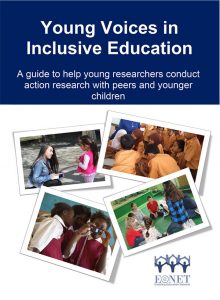We developed guidance to help young people work with younger children to investigate inclusion issues.
 The guidance document is entitled: Young Voices in Inclusive Education. A guide to help young researchers conduct action research with peers and younger children
The guidance document is entitled: Young Voices in Inclusive Education. A guide to help young researchers conduct action research with peers and younger children
It is designed to be used with teenagers and young people (e.g. secondary school and college students). It helps them to learn about participatory action research approaches they can use with their peers and with younger children to enable them to share their experiences of education and ideas for improving their schools.
During 2018 we tested the activities in Armenia and Ukraine, with the help of fellow OSF grantees – Bridge of Hope Armenia and Ukrainian Step by Step Foundation. We worked with some amazing secondary school children, aged 12-15, who quickly became proficient researchers. They then worked with groups of younger children (aged 7 and under) from primary schools and kindergartens, to help these youngsters express and record opinions about their teachers and their schools. The young children and the young researchers came up with some excellent suggestions for changes that would make their schools more inclusive and supportive. They also decided they wanted to work together more often, to help each other’s learning and to make younger children’s transition to the next level of education less worrying.
We would love to hear your experiences of helping young researchers to conduct education-focused action research with their peers and with younger children. Please contact us if you have a case study to share.
